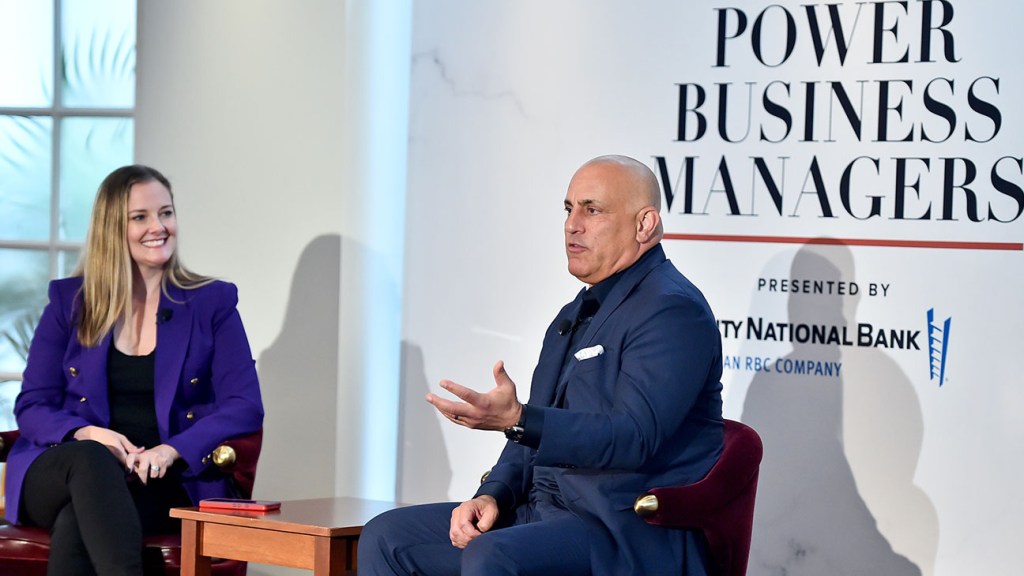CAA‘s Ted Chervin joined The Hollywood Reporter senior business editor Ashley Cullins on Wednesday for a keynote conversation at THR’s annual Power Business Managers event to discuss the intertwining of Hollywood and the sports world.
Chervin acknowledged that there’s been a breakdown of barriers between sports and entertainment, and even within entertainment itself, because of “a combination of the democratization of information with social media and other ways that people have of accessing both information and opportunities,” as well as the realization that sports is, essentially, entertainment.
The success of Ted Lasso and the resulting increased American interest in soccer was one such example, as Chervin — who counts Ted Lasso co-creator Bill Lawrence as his first client — recalled that when trying to sell the show they encountered “a lot of skepticism.”
“Nobody wanted it: Netflix passed, Amazon passed, HBO Max passed, Apple bought it I would say reluctantly. They were fans of Bill’s and Jason Sudeikis’, but they were concerned it sounded too much like a Saturday Night Live sketch. … Bill basically had to convince them that the kinds of shows that he wrote and created had real emotional stakes,” the agent explained, noting that the subsequent interest in real soccer is “a great lesson in the power of entertainment to influence sports the same way that sports has a power to influence entertainment.”
The conversation also explored the trend of athletes and stars getting involved in the ownership of sports teams — especially soccer clubs — such as Ryan Reynolds and Rob McElhenney (Wrexam AFC), Michael B. Jordan (AFC Bournemouth) and Tom Brady (Birmingham City). Chervin noted that these investments could be emerging in part because they have more access and information than ever before and are “much, much wealthier than they ever were before,” with athlete deals now higher than ever.

Ted Chervin and Ashley Cullins
Alberto Rodriguez/The Hollywood Reporter via Getty Images)
Chervin says high earners buying into sports is an outlet for them to invest in more fun and adventurous ways, and it benefits the teams, too.
“The owners of those teams recognize the power of what are essentially mega influencers; if you think about a star athlete or a movie star, they have massive communities of passionate followers who deeply care about what they think, what they say, what they wear, what they eat, what they drink, what team they’re interested in. So having them part of an ownership group, even as a minority owner, can be extraordinarily valuable to the extension of that brand, which is essentially what a team is,” Chervin said. “There’s a reciprocity to the interest level there. The athletes or movie stars wanting to expand their portfolios and what they’re involved with, but it also benefits the teams.”
He also noted the sports business is often a very lucrative one: “Talk about the challenges to the business model in TV and film, at least so far there are no challenges that I can see to the business model for professional and, frankly, for college sports. Given that, I think you’re going to see athletes and entertainers who want to be a part of that.”
The Q&A concluded with a discussion about athletes increasingly launching production companies and producing content, though Chervin explained that pivoting to Hollywood isn’t right for everyone.
“It’s not enough that the athlete be great at his or her sport. It’s not enough that the athlete say that they want to have this kind of a company or drive this type of content. They have to have an authentic point of view, a set of interests, they have to have a good team around them, and they also have to be willing to really walk the walk, which means being at pitch meetings or taking general meetings, being on certain calls. Things just don’t happen,” he said. “They require a lot of people to do a lot of different things. And if the athlete wants this to work, it has to be something they’re willing to spend real time on and real focus on, and for a lot of athletes there’s a limited amount of bandwidth.”

THR publishers Victoria Gold (left) and Beth Rabishaw
Alberto Rodriguez/The Hollywood Reporter via Getty Images
The keynote was part of a breakfast celebrating Hollywood’s Top Business Managers. Richard Raffetto, president of City National Bank, the presenting sponsor of the event, kicked off a lineup of speakers that included THR publishers Victoria Gold and Elisabeth Rabishaw.
Also during the event, Mark Landesman was honored as the 2023 Business Manager Icon, and his client Tracy Morgan presented him with the award. The two spoke of their 20-year relationship, which included Landesman coming to Morgan’s aid following his devastating car crash in 2014 that left the comedian in a coma.

From left: Tracy Morgan, THR co-editor-in-chief Nekesa Mumbi Moody and Mark Landesman
Alberto Rodriguez/The Hollywood Reporter via Getty Images
“He’s more than just a business manager, he’s more than just a friend, Mark is a member of my family,” Morgan said in his speech. “Mark, you are like a brother to me, and from the bottom of my heart, thank you for all that you’ve done and all you’ve done for me.”
For his part, Landesman detailed learning about Morgan’s crash on the news and rushing to the hospital, then being heavily involved in Morgan’s long recovery. Today, the business manager said he’s “happy to say my relationship with Tracy is totally back to normal. I talk him out of buying all the Ferraris; I tell him, don’t buy this, don’t buy that, don’t buy the Brooklyn Bridge and save your money. And we usually argue and he’ll hang up on me a few times.”
THR‘s 13th annual breakfast was held at Cut in the Beverly Wilshire Hotel.

From left: Cathy Field, THR president Joe Shields and Lori O’Connor
Alberto Rodriguez/The Hollywood Reporter via Getty Images




